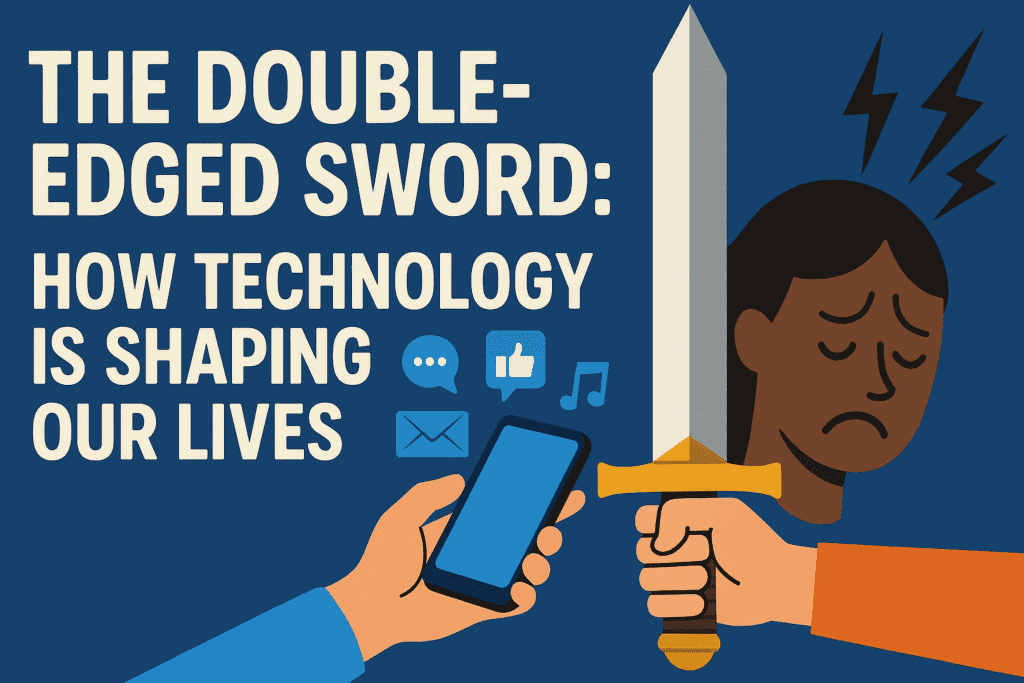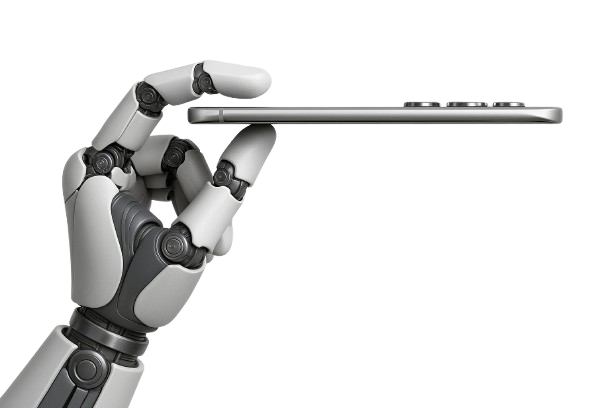How Technology is Shaping Our Lives: Navigating a Digital Revolution
In today’s fast-evolving digital era, it’s impossible to ignore the profound influence technology has on every facet of our existence. From waking up to a smart alarm that gently nudges us into the day, to ordering groceries with a few taps on our smartphones, technology is interwoven into our daily routines. It offers remarkable convenience, efficiency, and a gateway to innovation. However, alongside these benefits come mounting concerns surrounding mental health, data privacy, and digital dependency. This blog takes a comprehensive look at both sides of the coin, inviting you to reflect on your personal relationship with modern technology.
Embracing the Digital Era: An Introduction
The modern world is characterized by a relentless drive toward digitalization. Every day, we interact with devices and systems designed not only to simplify our lives but also to transform routine activities into dynamic, digital experiences. Consider the simple act of turning off your morning alarm—a smart device can now analyze your sleep patterns and gradually wake you up when you’re at your lightest sleep phase. Similar innovations have revolutionized everything from how we communicate to the way we access healthcare.
Yet, for all its brilliance, this technological revolution brings with it a series of challenges that merit consideration. As we applaud the advancements that fuel personal convenience and professional productivity, it is equally crucial to address the unforeseen repercussions. In this blog post, we will explore several core areas where technology is molding our lives: connection, work, healthcare, education, smart living, and the psychological impact of our digital immersion.
How Technology Is Shaping Our Lives Through Connection
Technology has radically redefined human connection and communication. Social media platforms, instant messaging applications, and video conferencing tools have forever altered how we build and maintain relationships. Families dispersed across continents can share life’s precious moments via a simple video call. Friends can exchange stories in real time regardless of where they are in the world. For businesses, these innovations have shattered geographical boundaries, enabling teams to collaborate in real time on projects and ideas.
However, this surge in hyper-connectivity is not without its challenges. While digital platforms allow us to remain “connected,” the ease of online interactions sometimes comes at the expense of quality face-to-face relationships. Many individuals report a paradoxical sense of isolation despite the constant ping of notifications on their devices. The curated nature of social media feeds can lead to feelings of inadequacy or disconnection, as virtual interactions sometimes replace deeper, in-person conversations.
Furthermore, the ubiquity of online communication raises questions about the authenticity of our connections. Are we truly forging bonds, or are we trading fleeting digital interactions for the warmth of personal relationships? In a world where everyone is just a click away, the challenge becomes striking a balance between virtual presence and meaningful real-world engagement.
How Technology Is Shaping Our Lives in Work, Efficiency, and Innovation in a Tech-Driven World
The landscape of work has been irrevocably transformed by technology. Cloud-based platforms, artificial intelligence, and a host of digital collaboration tools are redefining what work means in the 21st century. Remote work, once reserved for a select few, has become a norm for millions around the globe. With video conferencing platforms, instant messaging, and online project management tools, colleagues can collaborate seamlessly regardless of their physical location.
Digital transformation in the workplace has also fueled a new era of productivity and innovation. Automation and AI-driven solutions are not only streamlining monotonous tasks but also opening up new opportunities for creative problem solving. Consider a scenario where machine learning algorithms analyze market trends in real time, enabling businesses to pivot quickly and make data-informed decisions. This agility in the digital workplace is a cornerstone of modern innovation.
Yet, the relentless pace of change is not without its toll. Employees are now in a race to keep up with continuously evolving digital tools and platforms. The pressure to master new software in a compressed time frame can lead to stress and burnout. Furthermore, the rapid integration of automation brings up concerns about job security. As machines take over repetitive or mundane tasks, there’s a growing anxiety that some roles may be rendered obsolete.
The rapid shift toward digital work culture demands a proactive approach to continuous learning, robust support systems, and policies aimed at ensuring employee well-being. The modern professional is not just required to be tech-savvy; they must also be resilient and adaptable to sustain productivity in an ever-changing digital landscape.
How Technology Is Shaping Our Lives in Healthcare: From Clinics to Clicks
Perhaps no sector illustrates the life-changing power of technology quite like healthcare. The digital revolution in this industry is nothing short of transformative. Telehealth services, smart health devices, and AI-based diagnostic tools have made quality healthcare more accessible and efficient than ever before.
Imagine being able to consult with a specialist located on another continent without leaving your home. Telemedicine platforms provide just that—enabling patients to receive consultations, reviews, and even prescriptions at the click of a button. Wearable technology such as fitness trackers and smartwatches now monitor vital health metrics like heart rate, sleep patterns, and oxygen levels with astounding precision. This data is invaluable not only for individual health tracking but also for early detection of potential health issues.
However, as much as technology enhances our healthcare journey, it also introduces complex ethical dilemmas. Who really owns the vast troves of personal health data that these devices collect? Can we trust algorithms to diagnose intricate conditions that might require the nuanced judgment of a seasoned clinician? As AI systems become more embedded in health diagnostics, ensuring transparency and accountability in these processes becomes a top priority.
The dual nature of technology in healthcare—its ability to heal and its potential to compromise privacy—highlights the necessity of establishing robust legal and ethical frameworks. As patients and healthcare providers alike embrace these digital tools, it becomes crucial to strike a balance between leveraging technology’s benefits and safeguarding individual rights. In doing so, we can transform healthcare into a domain that is not only innovative but also ethically responsible.
How Technology Is Shaping Our Lives in Education in the Digital Age
The impact of technology on education is profound and multifaceted. Digital classrooms, online learning platforms, and interactive educational applications have revolutionized the traditional learning paradigm. The digital age has democratized education, breaking down geographical and socioeconomic barriers that once restricted access to quality education.
With the advent of Massive Open Online Courses (MOOCs), virtual libraries, and educational apps, students can now access a vast reservoir of knowledge regardless of their location. Educators are increasingly embracing digital tools to create more dynamic, interactive, and personalized learning environments. These changes have made it possible for learners to progress at their own pace and tailor their educational journey to suit their unique needs.
Despite these advancements, the digital transformation of education is not without its challenges. One of the most pressing issues is the digital divide. Not all students have equal access to high-speed internet or the latest devices, resulting in a stark inequality in learning opportunities. This divide can have far-reaching consequences, potentially exacerbating existing socioeconomic disparities.
Moreover, the shift towards digital education requires teachers to adapt to new technologies and methodologies, often with minimal training. This rapid evolution can create stress within the educational community as educators strive to keep pace with the changing dynamics of learning. To fully realize the promise of digital education, it is essential for policymakers, educators, and technology providers to work together to ensure that digital tools are accessible, inclusive, and effective for all students.
How Technology Is Shaping Our Lives in Living: Convenience Meets Complexity
The advent of smart technology is reshaping our day-to-day living environments in ways that were once the stuff of science fiction. Today’s smart homes are equipped with an array of devices—from voice assistants and mobile-controlled appliances to home automation systems—that streamline everyday tasks and enhance our comfort. Picture arriving home and having the lights adjust automatically to your preferred ambiance, or your thermostat fine-tuning the temperature based on your routine. These conveniences have transformed our living spaces into responsive, interactive environments that adapt to our lifestyles.
However, this elevated convenience is not devoid of complications. As our reliance on smart devices increases, so does the complexity of managing them. The interconnected nature of smart gadgets introduces vulnerabilities in the form of cyberattacks and data breaches. A single security loophole in a smart home network could potentially compromise every linked device, exposing sensitive personal information and disrupting the seamless functionality that defines modern living.
Moreover, the failure of a smart system—whether due to technical glitches or software errors—can trigger significant disruptions. The promise of a smart home hinges on robust, reliable connectivity, and the occasional breakdown can serve as a stark reminder of technology’s inherent fragility. As we integrate more smart systems into our daily lives, it becomes increasingly important to adopt rigorous cybersecurity practices and to remain mindful of the potential consequences of our growing technological dependency.
The Psychological Trade-Off: How Technology Is Shaping Our Lives in Balancing Digital Engagement With Mental Well-Being
While technology enriches our lives by unlocking new realms of communication, education, and convenience, its overuse carries psychological implications that cannot be ignored. Our digital interactions, though beneficial in many ways, also introduce a set of challenges that affect our mental well-being.
The omnipresence of digital devices means that we are nearly always connected, which can sometimes lead to digital fatigue. Extended screen time, constant notifications, and the pressure to curate a perfect online persona can contribute to heightened stress and anxiety. Research suggests that excessive digital engagement may lead to reduced attention spans, disrupted sleep patterns, and even feelings of isolation—ironic outcomes in a world that prides itself on enhanced connectivity.
Digital dependency can also dilute the quality of our interpersonal relationships. The constant barrage of online stimuli may distract us from fully engaging with the people around us, leading to superficial interactions in place of deeper, more meaningful connections. This paradox—where technology designed to unite us can leave us feeling more isolated—poses significant questions about how we manage our digital lives.
Addressing this psychological trade-off involves more than just reducing screen time; it requires intentional digital mindfulness. Techniques such as scheduled digital detoxes, mindful consumption of online content, and prioritizing offline interactions can help restore balance. As individuals, we have the power to harness technology as a tool for enrichment rather than allowing it to become a source of stress and distraction.
The Double-Edged Sword of Technological Advancements
At the heart of our modern experience with technology lies a compelling paradox—a true double-edged sword. On one edge, technology serves as a powerful tool for progress, unlocking opportunities for innovation, personal growth, and global connectivity. On the flip side, its rapid evolution carries inherent risks such as privacy breaches, mental health challenges, and socioeconomic disparities. This duality compels us to evaluate both the benefits and the pitfalls of the technological advances that define our era.
Consider the advancements in artificial intelligence. AI has not only revolutionized industries from finance to healthcare but also holds the promise of solving some of humanity’s most complex problems. Yet, the same technology that drives these innovations also poses significant ethical dilemmas: questions about job displacement, decision-making transparency, and the societal implications of delegating human responsibilities to machines. Embracing technology with clear-eyed awareness of these risks is imperative if we are to harness its potential without suffering its unintended consequences.
While technology has undoubtedly brought countless benefits, its rapid advancement also casts a long shadow over modern life. One of the most alarming downsides is digital addiction. Smartphones, social media platforms, and endless entertainment options have created a loop of instant gratification, leading to shortened attention spans, increased anxiety, and mental fatigue. This addiction is especially prevalent among younger generations, whose mental health is increasingly affected by screen overexposure.
Ironically, in a world that promises to connect us more than ever before, social disconnection is becoming a growing concern. People often spend more time interacting with screens than with loved ones, leading to weakened family bonds and a decline in face-to-face communication. This disconnection is not just emotional but societal, as the quality of human relationships is being replaced by virtual interactions.
Another critical issue is the erosion of privacy. From smart devices listening to our conversations to apps tracking our every move, personal data is constantly being collected—often without our explicit consent. This data can be exploited, sold to third parties, or used to manipulate behavior, raising serious ethical concerns about individual rights and autonomy.
The rise of digital platforms has also given birth to cyberbullying and online harassment. Social media, while empowering, has become a breeding ground for hate speech, trolling, and cancel culture. Teenagers and young adults are particularly vulnerable, with many suffering emotionally and psychologically from digital abuse that follows them everywhere.
In the economic realm, technology-driven automation is displacing countless jobs, particularly in industries like manufacturing, retail, and transportation. While new jobs are being created in tech sectors, they often require skills that many traditional workers do not possess, leading to a widening gap between the digitally literate and the left-behind.
Additionally, the overwhelming presence of technology contributes to information overload and the spread of misinformation. The internet is flooded with content, much of which is unverified, biased, or outright false. The emergence of deepfakes and AI-generated text blurs the lines between reality and deception, making it harder for users to discern fact from fiction.
The environmental impact of our tech obsession is also severe. The production and disposal of electronic devices generate massive amounts of e-waste, and the servers that power our digital lives consume enormous energy, contributing to global carbon emissions.
Moreover, the increasing use of surveillance technologies by governments and corporations raises concerns about mass surveillance and loss of freedom. Under the guise of security and convenience, individuals are being constantly monitored, with little transparency about how their data is used or stored.
Our growing overreliance on technology is also weakening fundamental human skills. Dependence on GPS has dulled our natural sense of direction, while constant internet access is reducing our ability to recall information or solve problems independently.
Finally, the world faces a serious digital divide, where access to technology is uneven. While some enjoy the latest innovations, many communities lack access to reliable internet, quality education tools, and digital resources, exacerbating existing inequalities in healthcare, education, and economic opportunity.
When it comes to war and conflicts, technology has proven to be one of the most powerful double-edged swords in human history.

On one side, technological advancements have enabled more precise weaponry, advanced defense systems, and cyber intelligence tools that help deter or reduce casualties in warfare. Drones, satellite surveillance, and artificial intelligence now allow military operations to be carried out with surgical accuracy, often without risking soldiers’ lives. However, the dark side of this progress is deeply unsettling. Modern warfare has become increasingly impersonal, with remote-controlled drones capable of carrying out lethal attacks thousands of miles away, often with limited accountability or oversight. The rise of cyberwarfare poses a new frontier of conflict, where nations can cripple each other’s infrastructure—power grids, financial systems, and communication networks—without a single bullet being fired.
Moreover, technology has also amplified the speed and scale of misinformation during conflicts. Propaganda spreads rapidly through social media, influencing public opinion and inciting hatred or violence. Deepfake videos and AI-generated content can manipulate reality, making it difficult to distinguish truth from fiction in the heat of conflict. This has profound consequences on global diplomacy and internal stability, often escalating tensions rather than diffusing them. Additionally, the development and proliferation of autonomous weapons—machines that can select and engage targets without human intervention—raise serious ethical questions about the future of warfare and the potential for catastrophic consequences if such systems malfunction or are used irresponsibly.
In the geopolitical arena, technological superiority has become a new kind of arms race, widening the power gap between nations. Wealthier countries are equipping themselves with next-generation defense systems, while poorer nations struggle to catch up or are left vulnerable. This imbalance fosters resentment and may even encourage proxy wars, cyberattacks, or terrorism as desperate measures. Even peacekeeping efforts are affected; while technology can assist in surveillance and conflict resolution, overreliance on it can sometimes dehumanize diplomacy and reduce the willingness to engage in meaningful, empathetic negotiation.
In essence, while technology in warfare offers strategic advantages and innovation, it also escalates the potential for destruction, dehumanization, and long-term geopolitical instability. Without strict ethical frameworks and international regulations, the tools meant to protect humanity could very well be the ones that cause irreparable harm.
In short, while technology is a powerful tool for progress, it is also a double-edged sword. Without conscious use, ethical oversight, and inclusive access, the very innovations meant to enhance our lives could also undermine the core values of human connection, privacy, and equality.
Navigating the Future: A Call for Conscious Digital Engagement
As we look toward the future, one thing becomes abundantly clear: our journey with technology is just beginning. The innovations of today lay the groundwork for the transformative breakthroughs of tomorrow. With emerging fields like quantum computing, the Internet of Things (IoT), and immersive virtual realities on the horizon, the digital landscape will continue to evolve at a breathtaking pace.
Yet, amid this relentless advancement, the core challenge remains the same: how do we ensure that technology serves as an aid to human progress rather than an unchecked force that erodes our quality of life? The answer lies in finding a delicate equilibrium—a balance between embracing digital innovation and preserving the essential elements of our humanity.
Policymakers must work hand in hand with technology developers to craft regulations that protect user privacy, promote equitable access, and safeguard against the unintended consequences of rapid digital transformation. Simultaneously, individuals need to cultivate digital literacy and mindfulness. By critically evaluating the tools we use and setting boundaries that prevent digital overload, we can incorporate technology into our lives in a way that enriches rather than diminishes our day-to-day experiences.
In practice, this balanced approach might involve rethinking our work environments to prioritize both productivity and well-being, or embracing smart home technologies while remaining vigilant about cybersecurity. It also means fostering an educational ecosystem where technology serves as a bridge to knowledge rather than a barrier that reinforces existing inequalities.
Final Thoughts: How Technology Is Shaping a Balanced Digital Future
Our digital era presents a tapestry of opportunities and challenges, each woven with threads of innovation and caution. From the promise of instantaneous global connections and groundbreaking medical advancements to the psychological toll of prolonged digital engagement and the risks of over-dependency, technology’s role in our lives is both revolutionary and profoundly complex.
As we stand on the threshold of further digital innovation, it is incumbent upon all of us—whether as consumers, professionals, or policymakers—to engage with technology consciously and responsibly. By striking a balance between excitement for the future and a commitment to our well-being, we can chart a course that harnesses the best that technology has to offer while safeguarding the values that define us as human.
In reflecting on how technology is shaping our lives, remember that each digital interaction is an opportunity: an opportunity to connect more deeply, work more efficiently, learn more dynamically, and even care for ourselves and others in meaningful ways. The journey ahead is one of continuous learning and adaptation—a collective endeavor that requires both innovation and empathy.
Let us approach this digital revolution not as passive recipients of technological change, but as active architects of a future where innovation and humanity coexist in harmony. In doing so, we ensure that technology remains a powerful ally in our quest for progress, rather than a tool that diminishes the essence of our shared human experience.
In conclusion, our exploration of technology’s pervasive role in modern life reveals a multifaceted narrative—a story of progress intertwined with responsibility. As we navigate this digital revolution, the challenge is not simply to advance technologically, but to do so with wisdom, intention, and care. Whether you’re leveraging digital tools for personal growth, professional efficiency, or simply to stay connected in a bustling online world, remember that mindful engagement is the key to unlocking technology’s full potential without losing sight of who we are.
Embrace the digital future, but always remain conscious of the impact each technological stride has on your mental well-being, your relationships, and your overall quality of life. The power to shape this future lies in our collective hands. After all, technology, in all its transformative glory, is only as beneficial as the values and intentions we infuse into its use.
Stay engaged, stay informed, and let’s work together to build a digital world where innovation, ethics, and humanity go hand in hand.
By examining every dimension—from connectivity and work to healthcare, education, smart living, and our mental landscape—we gain deeper insight into how technology is not merely a tool, but a transformative force. As you move forward in this digital age, ask yourself: How can you balance the benefits of technology with the need for genuine, human connection? What steps will you take to ensure that the convenience of tomorrow does not come at the expense of your well-being today? These contemplations are the first steps toward a future that honors both progress and our shared human spirit.




1 thought on “The Double-Edged Sword: How Technology is Shaping Our Lives”